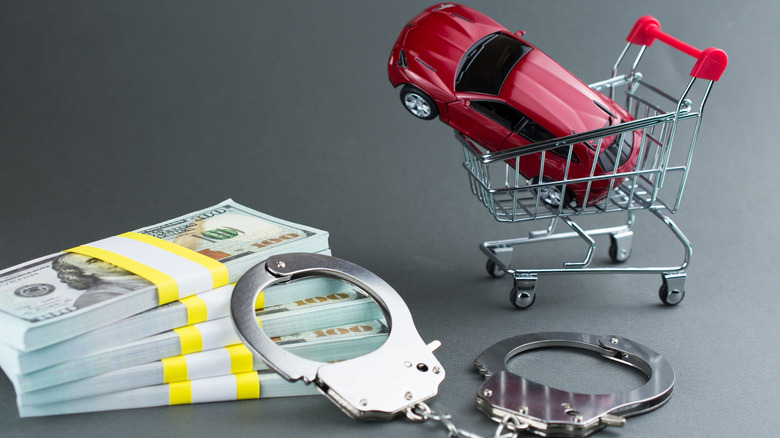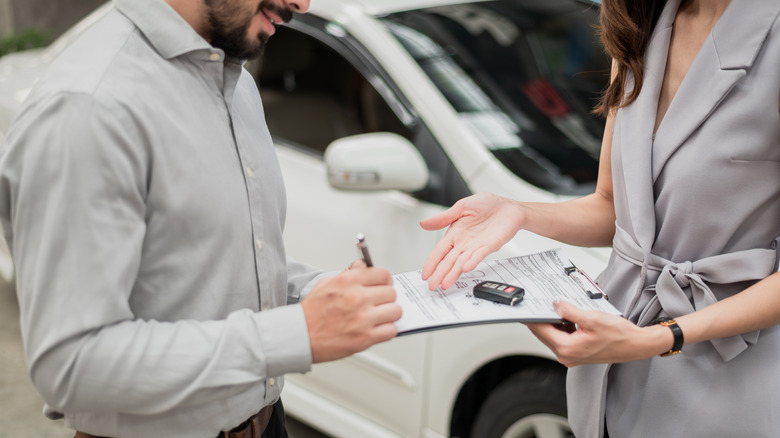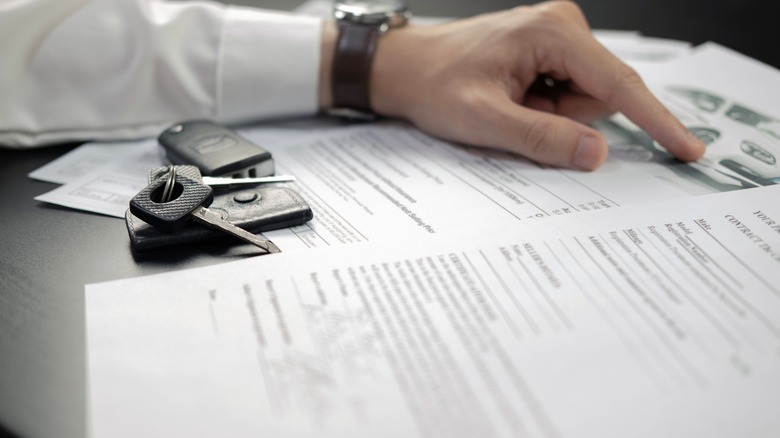How To Identify A Credible Car Dealer: 5 Essential Indicators
Buying a car for yourself, new or used, can be a very stressful experience, even if you pick the best time of year to do it. It's an absolutely titanic financial investment, possibly one of the biggest you'll make, and you need to be certain that you get a car that fits your needs, wants, and budget.
In this stressful situation, there is unfortunately a surplus of less-than-savory individuals who may seek to take advantage of you. Do you know why the shifty, fast-talking used car salesman is such a ubiquitous character archetype in TV and film? Because people like that actually exist — individuals who would love nothing more than to swipe your hard-earned cash and leave you with a lemon.
To ensure you don't get taken for a ride (in a bad way), you need to do your due diligence in locating a reputable car dealer — one that will get you the car that you need, rather than the one they want. If you're on the hunt for a credible seller, there are a few vital signs you should keep an eye out for.
Genuinely positive reviews
As with any other place of business, the first thing you should do to scope out a dealer is see what the people are saying about it. Most dealers maintain a presence on Google, as well as dedicated automotive websites like Carfax and DealerRater. You can check out user ratings and reviews on these sites to see what the general customer experience has been. If they have a high rating, that's a good sign.
When checking ratings, though, remember to actually take the time to read through customer reviews, rather than just checking star ratings. It's unfortunately very easy to falsify ratings with dummy accounts — if a lot of the reviews for a dealership seem similarly written, or don't even have complete blurbs, it's possible the dealership is working to bolster its own presence with nonexistent customer praise. Treat any five-star review without a proper description with a grain of salt.
No legal trouble
In a similar vein to positive reviews, it's also important to verify whether or not a local dealer has ever run afoul of the law, and if they have, how recent and severe it was.
You can perform a surface-level check for this kind of information by running a Google search of the dealer's name along with keywords like "scam" or "complaint." If you see any outstanding reports of fraud, false advertising, or general customer mistreatment, that's a giant red flag.
For more detailed information, you can get in contact with your local state consumer protection office. These agencies, working on behalf of your state government, maintain detailed records of consumer complaints against individuals and businesses. You can visit the United States government's website to find a list of state offices with contact information.
Call up your local office to inquire on the legal state of a particular business, and the should let you know if they've got a clean legal bill or a checkered past.
Friendly, accommodating staff
The main goal of any dealer associate is, of course, to sell you a car. However, the way they go about doing that makes all the difference. If a dealer is on the unsavory side, staff members may be pushy or cagey, pressuring you to immediately purchase a car at whatever price they set. They also tend to talk around whatever questions you may try to raise, while also trying to ask probing, leading questions themselves.
A proper car dealer is both friendly and accommodating. They're there to help you, not the other way around — it's their job to carefully and accurately answer your questions and concerns to get you into a car that both of you can be happy with.
Perhaps most importantly, good car dealer staff is low-pressure — if you're not sure you want to buy a car right away and need to come back another time, they're fine with letting you go. They'll be there to receive you again if you decide to return, and that's just fine.
Comprehensive documentation
Appropriately for such a large investment, any potential car purchase should be accompanied by a veritable mountain of documentation. Daunting though it may seem, this level of information is a hard requirement, as you need a complete buyer's guide, user manual — and in the case of used cars, upkeep history — for any car you buy. Even if a dealer tries to convince you that the paperwork isn't important or necessary, it is both extremely important and absolutely necessary.
A proper car dealer has all of the relevant information for a particular car hot and ready to go whenever it's requested (and you should always request it). You need a complete list of the car's features, upkeep requirements, and maintenance and ownership histories. Information is your secret weapon against buying lemons, and a credible dealer will be all too happy to provide that information — and in writing at that.
Verified inventory
Perhaps the most important thing you need to ensure when visiting a car dealer is whether or not they actually have the car you're looking for. It's easy enough for a dealer to say they have a car of a particular make and model in stock on a website or in a phone call, but if it's not actually there when you show up, they may try to coerce you into buying something similar (and perhaps more expensive).
There are tools available to externally verify whether a dealer actually has the car you want in stock. Organizations like Edmunds and Kelley Blue Book have inventory checkers that can look for cars at any dealership in their network. A good dealership should have not just the car you want, but a wide selection of similar cars to provide you with some choosing power.
If you can't find the car that you wanted to purchase at your local dealer, despite its assurances, then that's a sign they're withholding information from you. For what reason, we couldn't say, but the mere act of it is a bad sign in itself.





